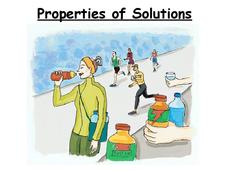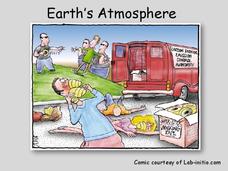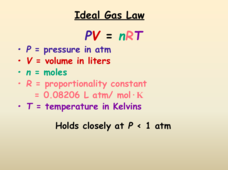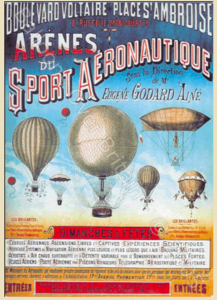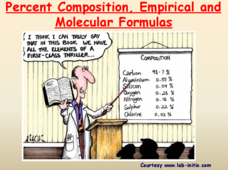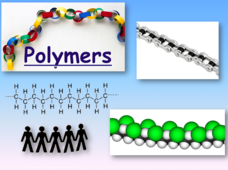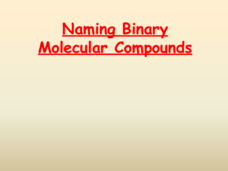Science Geek
Measurement of Pressure and Temperature
We all have standards and scientists are no exception. Presentation covers standard temperature, standard pressure, temperature conversions, and absolute zero. It explains pressure using pascals, mm of mercury, atmosphere, and torr, then...
Science Geek
Kinetic Molecular Theory
The fourth presentation in a series of five begins with information about the nature of gases and what to expect from them. Then it discusses kinetic molecular theory, diffusion, and Graham's Law, and concludes with the purification of...
Science Geek
pH Calculations
Performing calculations is for more than just mathematicians — it's an important science skill, too. Demonstrate the pH calculations using the slide show resource. The final resource of a seven-part unit introduces young scientists to...
Science Geek
Properties of Acids and Bases
It's all about that base! Teach the properties of acids and bases using the sixth slide show presentation in a series of seven. The lesson discusses acid and base properties and reactions. Pupils also see the effect on indicators when...
Science Geek
Colloids and Suspensions
Examine the properties of colloids and suspensions. A slide show defines each mixture and explains their properties. Pupils learn to identify each mixture and compare them to solutions.
Science Geek
Calculations of Solution Concentration
Teach the process of calculating concentrations of a solute. The fourth in a series of seven chemistry lessons shows the various types of calculations including grams per liter, molarity, parts per million, and percent composition. The...
Science Geek
Properties of Solutions
Study the properties of solutions as they relate to mixtures. The slide show presents the key concepts involved with solutions including solvents, solutes, solubility, and electrolytes. Scholars learn the basics of the properties of...
Science Geek
Phase Changes
Examine the energy transfer of phase changes through diagrams. The second slide show in a series of seven presents the information related to energy and phase changes. It includes the effect of pressure on phase changes.
Science Geek
Bulk Properties of Water
Learn the ins and outs of the properties of water through an engaging slide show. The lesson presents different facts about water including phase change, heat of fusion, heat of vaporization, and specific heat among others.
Science Geek
Basic Biochemistry - Carbohydrate, Protein and Fat
You are what you eat, right down to your molecular structure. A hearty presentation begins with the two types of carbohydrates, simple and complex. Then it details proteins and amino acids. It ends by reviewing the three types of fats,...
Science Geek
Electrochemistry
Introduce redox reactions including how to identify and solve them. After reviewing the rules for assigning oxidation numbers, a presentation presents trends and vocabulary. Finally, it explains voltaic cells, electrolytic cells,...
Science Geek
Earth's Atmosphere
Ozone gas absorbs the harmful UV-B rays and helps protect humans. An informative presentation begins with the layers of the earth's atmosphere, the pressure and temperature in each of the layers, the ozone layer, the ozone cycle, and the...
Science Geek
The Ideal Gas Law
When doing a gas lab, you might feel under pressure. A short presentation discusses the Ideal Gas Law. It begins with the units for each variable, then describes the behavior of real gases. The lesson concludes with a comparison of...
Science Geek
Gas Laws
A physical science presentation begins with an explanation of ideal gases and their behavior. Then it introduces all of the gas laws with descriptions and formulas.
Science Geek
Percent Composition, Empirical and Molecular Formulas
Help your pupils understand when empirical becomes molecular. The lesson presentation demonstrates the connection between empirical formulas and molecular formulas. Then, given percent composition, the lesson demonstrates the steps to...
Science Geek
Element Classes
Introduce your young chemists to alkali metals, alkali earth metals, transition metals, metalloids, nonmetals, halogens, and noble gasses with a presentation that explains the classes of elements and a few facts about each.
Science Geek
The Mole
What can you call a tooth in a glass of water? A one-molar solution! Presentation covers moles, Avogadro's Number, calculating formula mass, converting moles to grams, converting grams to moles, and calculations with moles. It is the...
Science Geek
Polymers
A pirate's favorite amino acid is Arrrrginine! Presentation begins with the difference between a monomer and a polymer. Then it applies that to carbohydrates and proteins and ends with DNA and plastics. Presentation is the last in a...
Science Geek
Intermolecular Forces of Attraction
Chemists love London (dispersion forces)! Presentation begins with an explanation of intermolecular forces including hydrogen bonding, dipole-dipole attraction, and London dispersion forces. It also covers polarity and the relative...
Science Geek
VSEPR and Molecular Geometry
Many chemistry jokes have no reaction. Presentation begins by explaining what models are and the limitations of various forms before introducing the VSEPR model. Then it outlines the rules for creating a VSEPR model and shows examples of...
Science Geek
Naming Binary Molecular Compounds
She has been reading that book about helium all day; she just can't put it down! Presentation begins with the rules for naming binary molecular compounds using prefixes and suffixes. After a list of prefixes for review, it offers guided...
Science Geek
Covalent Bonding
When it comes to covalent bonds, sharing is caring. Presentation covers the octet rule with multiple examples, Lewis Dot Structures with an example, and resonance. Presentation is the first in a five-part series.
Science Geek
Metallic Bonding
Introduce your class to metallic bonding with a presentation that covers packing in metals, substitutional alloys, interstitial alloys, and properties of metals.
Science Geek
Ionic Bonding
Here's a presentation that answers the age-old question of the covalent bond to the ionic bond, "Why won't you share?" Included is information about covalent and ionic bonds, the octet rule, ionic compounds, cations versus anions, and...








